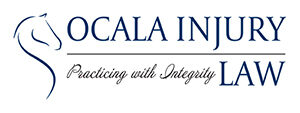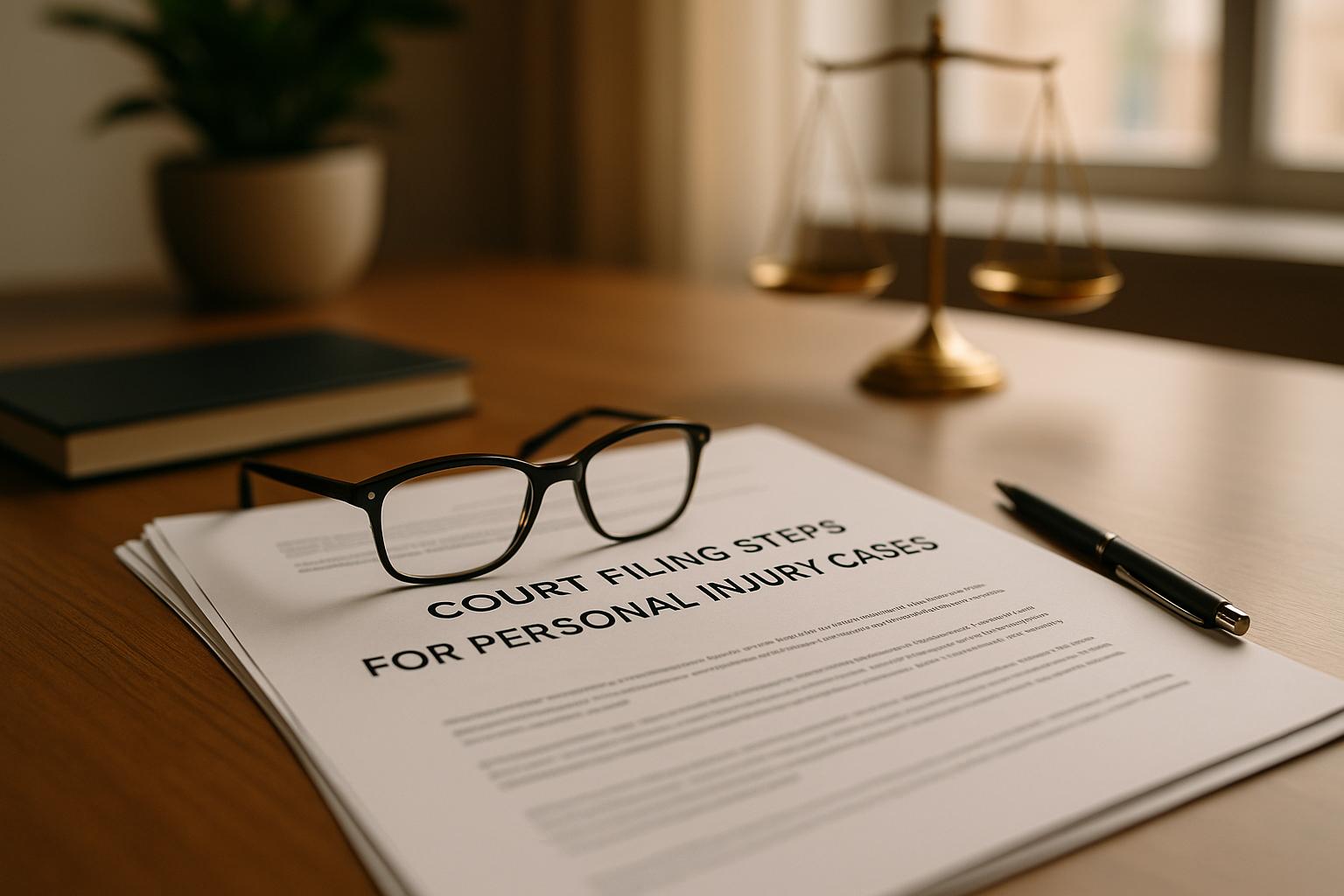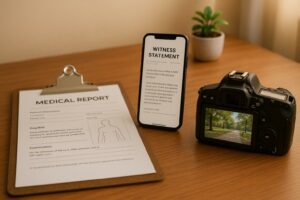Filing a personal injury case involves several critical steps to seek compensation for damages caused by someone else’s negligence. Here’s a quick overview:
- Collect Essential Documents: Gather medical records, accident reports, witness statements, and evidence of lost income or property damage.
- Understand Your Damages: Assess medical expenses, lost wages, and other costs, including future expenses like therapy or rehabilitation.
- File Your Complaint: Draft and file a legal complaint detailing the incident, damages, and legal claims, ensuring compliance with deadlines and legal requirements.
- Notify the Defendant: Serve the defendant with the complaint and summons following proper legal procedures.
- Gather Evidence: Collect detailed evidence, including expert opinions, to strengthen your case.
- Negotiate a Settlement: Most cases settle before trial. Prepare for negotiations with strong documentation and consider mediation if needed.
Missing deadlines or filing errors can jeopardize your case. Hiring an experienced attorney ensures proper handling of legal procedures and increases the chances of a fair settlement.
1. Before Filing Your Case
Building a solid foundation is key when preparing to file a personal injury case. Taking the right steps beforehand can make the process smoother and strengthen your position.
Collecting Required Documents
Make sure to gather and organize these essential documents:
| Document Type | Key Details | Purpose |
|---|---|---|
| Medical Records | Treatment history, bills, prescriptions | Shows the extent of injuries and related costs |
| Accident Reports | Police reports, incident details | Establishes the facts of the incident |
| Photo Evidence | Photos of injuries, accident scene, property damage | Provides visual proof of what happened |
| Witness Information | Contact details, written statements | Supports your account of events |
| Employment Records | Pay stubs, time-off requests | Documents lost wages |
Arrange everything in chronological order, make extra copies, and store digital backups to ensure nothing gets misplaced.
Understanding Your Damages
Take time to assess all the costs related to your injury, both now and in the future. Keep detailed records of:
- Medical Expenses: Include treatments, medications, and any rehabilitation costs.
- Lost Income: Note missed workdays and how your injury might affect future earnings.
- Property Damage: Record repair or replacement costs for damaged items.
- Additional Costs: Account for transportation, home adjustments, and medical equipment.
Don’t forget to consider possible future expenses, like ongoing therapy or medical care. These details are critical for calculating the full impact of your injury.
Getting Legal Help
"At Ocala Injury Law, we believe that every client deserves personalized attention and dedicated advocacy." – Ocala Injury Law
An experienced attorney can play a vital role by:
- Reviewing your documents and identifying potential challenges
- Ensuring all deadlines are met
- Calculating the compensation you may be entitled to
- Managing communications with insurance companies
"Our mission is to provide exceptional legal representation with integrity and compassion, ensuring that our clients feel supported and understood throughout their legal journey." – Ocala Injury Law
Ocala Injury Law offers free initial consultations, giving you the chance to discuss your case and explore your legal options without any upfront cost. This helps you understand your rights and decide on the best course of action.
2. Starting Your Lawsuit
Writing and Filing the Complaint
To start your lawsuit, you’ll need to file a complaint – a legal document that officially begins your case. This document must be accurate and include all necessary details. Here’s what it should contain:
| Component | Details | Purpose |
|---|---|---|
| Caption | Court name, parties involved, case number | Identifies the case |
| Facts | Incident details, date, location | Explains what happened |
| Legal Claims | Specific laws violated, legal theories | Outlines the basis for the case |
| Damages | Monetary amounts, types of compensation | States what you’re seeking |
| Signature | Your signature or your attorney’s | Confirms the document’s validity |
When drafting your complaint, focus on clarity and accuracy. At Ocala Injury Law, our team ensures every element complies with Florida court rules and deadlines.
Key steps to keep in mind:
- File your complaint within the statute of limitations.
- Include all required forms and pay the filing fees.
- Submit the necessary number of copies.
- Keep proof of filing for your records.
Once the complaint is filed, the next step is notifying the defendant.
Notifying the Defendant
After filing, you must notify the defendant through a process called "service of process." This step is critical to moving your case forward and has specific rules you must follow.
Timing Requirements:
- Service must be completed within the timeframe set by local court rules. Check these carefully.
- If needed, you can request an extension from the court.
- Proof of service must be filed with the court to confirm the defendant was notified.
Approved Service Methods:
- Personal delivery by a certified process server.
- Certified mail with a return receipt (if allowed).
- Service by the sheriff’s department.
- Publication, but only in specific cases with court approval.
Documents to Include:
- A copy of the original complaint.
- A court-issued summons.
- Any additional court orders or notices.
- Verification forms confirming service.
Hiring a professional process server can ensure this step is handled correctly and avoids unnecessary complications in your case.
3. After Filing Your Case
Court Timeline and Responses
After filing your case and serving the defendant, the next steps follow the court’s schedule. Deadlines and procedures can differ based on where you file, so it’s essential to check your local court’s rules and timelines.
The defendant’s response will determine the next steps. The court might schedule a case management conference or other proceedings to set deadlines for discovery, motions, and trial dates. Keep a close eye on these dates – staying on track is key to meeting court requirements.
Following Court Rules
Once the schedule is in place, following court rules is crucial. Courts often have specific guidelines for formatting and filing documents. Missing a mandatory hearing or conference can lead to serious consequences.
At Ocala Injury Law, we ensure all paperwork complies with court requirements and deadlines, helping you navigate the process efficiently and with confidence.
sbb-itb-68ed374
4. Gathering Evidence
Once your documents are organized, the next step is collecting detailed evidence to solidify your case.
Medical Records and Expert Opinions
Your medical records play a crucial role as they establish the connection between the accident and your injuries. These records serve as the starting point for expert evaluations, which can add credibility to your claim. Expert reports provide professional insights that support the validity of your case.
"Medical records and expert reports are essential documents for filing a personal injury case." – Ocala Injury Law
5. Settlement Process
Most personal injury cases are resolved through settlements rather than going to trial. In fact, the U.S. Bureau of Justice Statistics reports that about 95% of these cases settle before reaching the courtroom[^8^].
Negotiating Your Settlement
Settlement talks usually begin once you’ve reached Maximum Medical Improvement (MMI) – the point where your medical condition has stabilized, and all damages can be fully evaluated. At this stage, your attorney will draft a demand letter detailing your injuries and related losses. The goal? To secure compensation that fully addresses your damages.
Insurance companies often start with lowball offers. For instance, a $100,000 claim might initially receive a $40,000 offer. Negotiations then follow, and according to Ocala Injury Law’s 2024 case data, effective strategies can boost settlements by 20–30% beyond these initial offers[^1^].
Several factors influence settlement amounts:
| Factor | Example | Impact |
|---|---|---|
| Medical Expenses | $25,000 for surgery | Direct reimbursement |
| Lost Income | 6 months at $4,500/month | Based on documented earnings |
| Pain and Suffering | Chronic back pain (7/10) | Calculated using a multiplier |
| Evidence Strength | Surveillance footage | Can significantly raise value |
If negotiations hit a deadlock, mediation may help resolve the dispute without heading to trial.
Using Mediation
When settlement discussions stall, mediation can be a practical alternative. A neutral mediator helps both sides work toward an agreement. The American Bar Association notes that mediation resolves about 70% of personal injury cases[^4^].
Mediation is also far less expensive than preparing for trial. Costs typically range from $2,000 to $5,000, compared to the $15,000+ often needed for trial preparation. Additionally, the Florida Office of the State Courts Administrator reports that mediation can shorten case timelines by around 65% compared to court proceedings[^5^].
The mediation process generally includes three steps:
- Opening statements from both sides
- Private discussions with the mediator
- Finalizing an agreement
Mediation provides a confidential and controlled environment where parties can negotiate practical terms, such as structured payments. With a 70% success rate, it’s an effective way to avoid the uncertainty and expense of a trial.
To make the most of mediation, come prepared with thorough documentation of your damages and keep your expectations realistic. The aim is to reach a settlement that fairly compensates your losses while avoiding the risks and costs of litigation.
Summary
Filing a personal injury case requires detailed documentation and meeting strict deadlines. The process includes recording injuries and damages, filing a formal complaint, and notifying the defendant. Each phase is designed to methodically build your case.
"At Ocala Injury Law, we offer compassionate support throughout the legal process, ensuring you feel heard and understood every step of the way." – Ocala Injury Law
The main steps involve gathering documentation, starting the lawsuit, navigating court procedures, and negotiating a settlement. Missing a deadline can jeopardize your case, making accurate legal guidance essential. With expert help, court documents are handled correctly, submissions are on time, and your case is effectively represented.
Most personal injury cases are resolved through settlements rather than trials. Strong documentation and procedural accuracy improve your position during negotiations and help ensure fair compensation. Following these steps creates a clear path toward achieving a fair outcome.
FAQs
What should I do if I miss a deadline or make a mistake when filing my personal injury case?
If you miss a deadline or make an error in your personal injury case filing, it’s important to act quickly. Missing a deadline, such as the statute of limitations, could jeopardize your ability to pursue the case. Contact your attorney immediately to discuss your options, as they may be able to help correct the issue or seek an extension in certain circumstances.
For filing errors, minor mistakes can sometimes be amended, but this depends on the specific court rules and the nature of the error. An experienced personal injury attorney can guide you through the process and help minimize any potential impact on your case. If you have questions or need assistance, seeking professional legal advice is always a good step to protect your rights and ensure your case stays on track.
What are the benefits of hiring an experienced attorney for my personal injury case?
Hiring an experienced attorney can make a significant difference in the outcome of your personal injury case. They bring in-depth legal knowledge, handle complex paperwork, and ensure all filing deadlines are met. This allows you to focus on recovery while they advocate for your rights.
An attorney can also negotiate with insurance companies on your behalf, helping you secure the compensation you deserve for medical bills, lost wages, and other damages. With personalized legal support, you’ll have a trusted ally guiding you every step of the way.
What should I keep in mind when negotiating a settlement for a personal injury case?
When negotiating a settlement for a personal injury case, it’s important to consider several key factors to ensure you receive fair compensation. First, evaluate the extent of your injuries and the associated medical expenses, including future treatment costs. Second, account for lost wages or diminished earning capacity if the injury has impacted your ability to work. Third, consider non-economic damages such as pain and suffering or emotional distress.
It’s also crucial to understand the statute of limitations in your state, as missing deadlines could jeopardize your case. Before accepting any offer, consult with an experienced attorney to ensure the settlement reflects the full scope of your damages. Firms like Ocala Injury Law can provide expert guidance to help you navigate this process and advocate for your rights.




